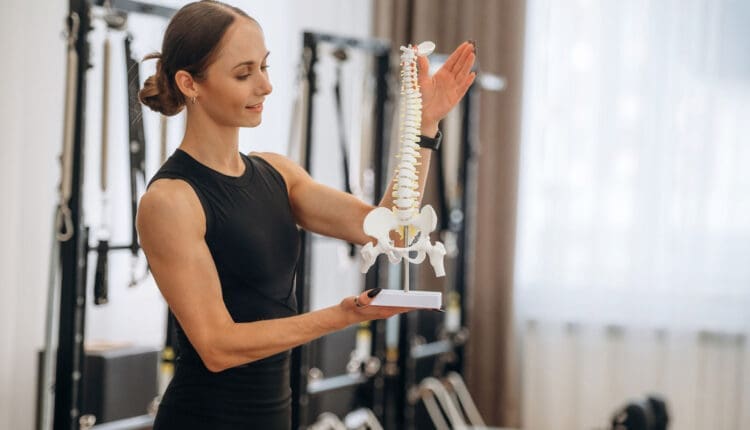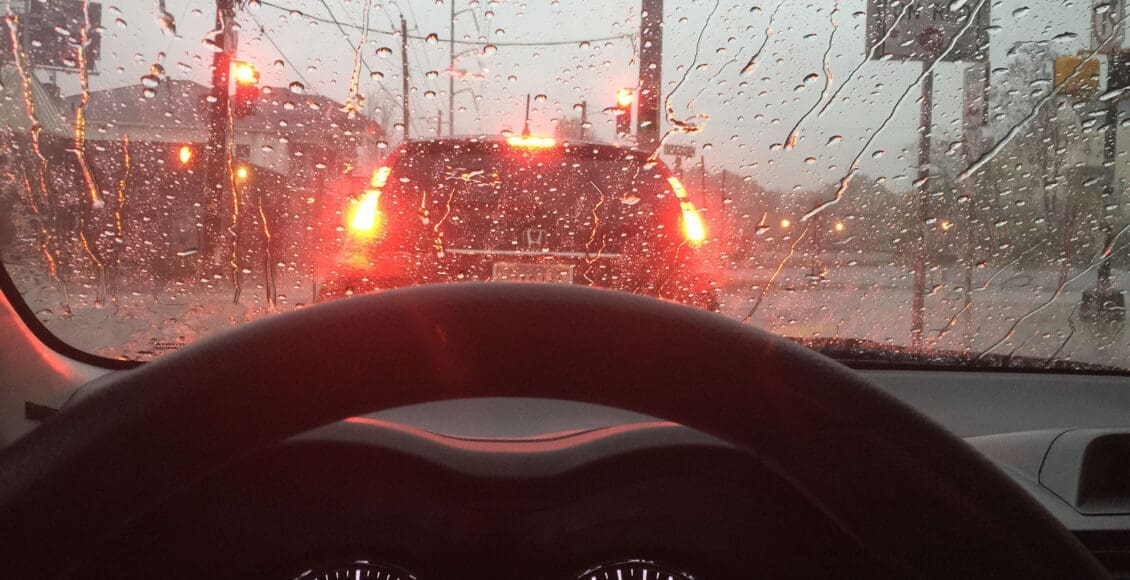Table of Contents
Rainy Weather, Minor Car Accidents, and Spinal Injuries: Understanding the Connection

Why Rainy Weather Makes Driving More Dangerous
Rain can turn a routine drive into a risky journey. Even a drizzle creates slick surfaces that reduce tire traction, making it harder to steer or stop. In heavier rainfall, visibility drops quickly, and hydroplaning becomes more likely. These weather challenges dramatically increase the chances of minor motor vehicle accidents (MVAs).
When water accumulates on roads, vehicles often lose grip and slide. This sliding—especially at intersections or during turns—can lead to low-speed collisions. According to the Texas Department of Insurance, rainy conditions are among the most dangerous weather scenarios for drivers, contributing to a sharp increase in minor accidents, especially when people are rushing or fail to adjust their speed and stopping distances (TDI, n.d.).
Even when drivers turn on their headlights and wipers, rain can still obscure lane markings and hide potholes or road debris. These hidden dangers can cause drivers to make sudden maneuvers, which often lead to fender benders and rear-end crashes.
Minor Accidents, Major Consequences: The Hidden Risk of Low-Speed Collisions
A low-speed crash may seem harmless at first. Many people feel okay immediately afterward and decline medical evaluation. However, minor MVAs during rainy conditions can still deliver enough force to misalign the spine or cause soft tissue damage.
Rain-related low-speed collisions commonly occur in parking lots, at stoplights, and in congested traffic where vehicles are following too closely. These slow but sudden impacts can trigger whiplash, herniated discs, or cervical strains. As highlighted by a Chicago legal firm, even crashes under 10 mph can jolt the spine in unnatural ways, especially when a driver or passenger is caught off guard (Chicago Lawyer, 2024).
While the vehicle might show a dent, your neck, back, or joints might absorb enough shock to create problems that linger for months—or even years.
How Wet Roads Affect Spinal Alignment and Soft Tissue Health
During a rainy-day accident, the force of impact may be transferred unevenly through your body. This uneven pressure often results in spinal misalignments—subtle shifts in the spine’s natural curve or the placement of vertebrae.
According to Springs Auto, wet roads can affect your vehicle’s suspension, steering, and wheel alignment, which, over time, can influence your posture while driving and even how your body reacts during a crash (Springs Auto, n.d.).
If the vehicle’s systems are out of alignment, chances are your body will experience uneven forces during a crash. This can cause the spine to twist or compress in unnatural ways, leading to back pain, neck stiffness, or long-term nerve irritation.
The Weather-Accident-Spine Chain Reaction
There’s a clear chain reaction:
- Rain causes low visibility, slippery roads, and hydroplaning.
- Drivers react poorly due to panic, distraction, or poor tire maintenance.
- Minor accidents result—rear-end bumps, curb impacts, or side swipes.
- The body absorbs the force, misaligning the spine or damaging muscles and ligaments.
Attorneys and medical experts agree that these seemingly “small” accidents are still medically and legally significant. Joyce & MacDonald emphasize that poor weather increases the frequency of crashes and the complexity of legal claims due to conflicting evidence and a lack of clear road visibility (Joyce & MacDonald, n.d.).
The Role of Soft Tissue Injuries After Rainy-Day Accidents
Soft tissue injuries involve damage to muscles, ligaments, and tendons. Rainy conditions make soft tissue injuries more common, not just because of crashes, but because drivers are often more tense during storms. Bracing for impact can make the body less resilient to force.
Even if you walk away without broken bones, your soft tissue may be inflamed, torn, or stretched beyond its normal limit. The neck, shoulders, and lower back are especially vulnerable.
The Knowles Law Firm explains that weather reduces control and sightlines, creating an environment where reactive movements and collisions are far more likely (Knowles Law Firm, n.d.).
Clinical Insight: Dr. Alexander Jimenez’s Dual-Scope Approach
Dr. Alexander Jimenez, DC, APRN, FNP-BC, is a unique healthcare provider based in El Paso, Texas. With dual credentials as a chiropractor and nurse practitioner, he offers both physical care and medical documentation. His patients often include individuals recovering from auto accidents, especially those with musculoskeletal injuries following minor weather-related collisions.
Dr. Jimenez emphasizes the importance of early imaging (like MRIs or CT scans) to diagnose spinal misalignments or soft tissue injuries that may not show up on X-rays. His integrative treatment plans often include chiropractic adjustments, physical therapy, functional medicine, and nutritional support.
He also helps patients navigate the legal-medical interface. That means his documentation is prepared not just for healing, but for assisting attorneys to demonstrate the injury’s cause and long-term effects.
How Chiropractic and Integrative Medicine Help Post-Accident
Chiropractic care is one of the most effective non-invasive treatments after a rainy-weather car crash. Spinal adjustments aim to correct misalignments, relieve pressure on nerves, and promote faster recovery.
Integrative care—such as combining chiropractic adjustments with massage therapy, acupuncture, and guided rehabilitation—helps patients regain mobility and reduce inflammation.
Dr. Jimenez also incorporates nutritional protocols to address inflammation at a cellular level, enhancing recovery for patients with soft tissue strain or disc issues.
Whether it’s a slipped disc, cervical sprain, or generalized back pain, addressing the root cause rather than masking symptoms is key to long-term relief.
Read More – Chiropractic Scientist
The Legal Impact of Rain-Related Accidents
Rain can complicate the legal aspects of auto accident claims. Insurance companies often argue that bad weather, rather than driver negligence, caused the crash. However, even in poor conditions, drivers are still responsible for adjusting their speed, braking distance, and maintaining their attention.
As noted by Salinas Trial Law, weather is frequently used as a defense tactic in auto claims—but with excellent medical records and clear injury timelines, patients can still win their cases (Salinas Trial Law, n.d.).
This makes documentation from dual-scope providers, such as Dr. Jimenez, essential, as he includes both objective tests and patient-reported symptoms that are time-stamped for legal use.
What to Do After a Rainy-Weather Fender Bender
If you’re involved in a minor accident during rainy weather, here’s what to do:
- Check for injuries—even if you feel “fine.”
- Seek medical evaluation within 24–48 hours.
- Document the crash with photos and written notes.
- Get imaging tests if you feel any discomfort in the neck, back, or hips.
- Visit a chiropractor or an integrative healthcare provider, such as Dr. Jimenez, to initiate your care.
Delayed symptoms are common. Whiplash, disc bulges, or nerve pain may not appear until days or weeks after the accident.
Conclusion: Be Proactive After Rain-Related Collisions
Rainy weather may only last a few minutes, but its effects can linger long after the skies clear. Minor car accidents during wet conditions can cause serious spinal and soft tissue injuries. These injuries may not be apparent immediately, which is why early evaluation, imaging, and integrative treatment are crucial.
Dr. Alex Jimenez’s unique dual-scope approach ensures that patients receive both medical care and legally compliant documentation, streamlining the path to healing. Whether you’ve been rear-ended in a rainstorm or bumped while braking at a wet intersection, don’t ignore the signs. A small accident can cause big problems—especially in the spine.
References
Chicago Lawyer. (2024). Understanding the impact of weather on low-speed collisions.
Hiller, H. (n.d.). Safe driving in hazardous weather conditions. HSI.
Joyce & MacDonald. (n.d.). How can poor weather conditions impact your car accident case?.
Knowles Law Firm. (n.d.). How weather can impact driving safety.
Lawyer Schwartz. (n.d.). Weather conditions that affect auto accidents.
Salinas Trial Law. (n.d.). How weather conditions contribute to car accidents.
South Sound Law Group. (n.d.). The impact of road conditions on motor vehicle accident claims: Navigating legal complexities.
Springs Auto. (n.d.). How weather conditions affect your vehicle’s alignment.
Texas Department of Insurance. (n.d.). Driving safely in bad weather [PDF].
The McArthur Law Firm. (n.d.). How poor weather causes crashes.
Post Disclaimer
Professional Scope of Practice *
The information herein on "Spinal Misalignment After Crashes: Treatment Options" is not intended to replace a one-on-one relationship with a qualified health care professional or licensed physician and is not medical advice. We encourage you to make healthcare decisions based on your research and partnership with a qualified healthcare professional.
Blog Information & Scope Discussions
Welcome to El Paso's Premier Wellness, Personal Injury Care Clinic & Wellness Blog, where Dr. Alex Jimenez, DC, FNP-C, a Multi-State board-certified Family Practice Nurse Practitioner (FNP-BC) and Chiropractor (DC), presents insights on how our multidisciplinary team is dedicated to holistic healing and personalized care. Our practice aligns with evidence-based treatment protocols inspired by integrative medicine principles, similar to those found on this site and our family practice-based chiromed.com site, focusing on restoring health naturally for patients of all ages.
Our areas of multidisciplinary practice include Wellness & Nutrition, Chronic Pain, Personal Injury, Auto Accident Care, Work Injuries, Back Injury, Low Back Pain, Neck Pain, Migraine Headaches, Sports Injuries, Severe Sciatica, Scoliosis, Complex Herniated Discs, Fibromyalgia, Chronic Pain, Complex Injuries, Stress Management, Functional Medicine Treatments, and in-scope care protocols.
Our information scope is multidisciplinary, focusing on musculoskeletal and physical medicine, wellness, contributing etiological viscerosomatic disturbances within clinical presentations, associated somato-visceral reflex clinical dynamics, subluxation complexes, sensitive health issues, and functional medicine articles, topics, and discussions.
We provide and present clinical collaboration with specialists from various disciplines. Each specialist is governed by their professional scope of practice and their jurisdiction of licensure. We use functional health & wellness protocols to treat and support care for musculoskeletal injuries or disorders.
Our videos, posts, topics, and insights address clinical matters and issues that are directly or indirectly related to our clinical scope of practice.
Our office has made a reasonable effort to provide supportive citations and has identified relevant research studies that support our posts. We provide copies of supporting research studies upon request to regulatory boards and the public.
We understand that we cover matters that require an additional explanation of how they may assist in a particular care plan or treatment protocol; therefore, to discuss the subject matter above further, please feel free to ask Dr. Alex Jimenez, DC, APRN, FNP-BC, or contact us at 915-850-0900.
We are here to help you and your family.
Blessings
Dr. Alex Jimenez DC, MSACP, APRN, FNP-BC*, CCST, IFMCP, CFMP, ATN
email: coach@elpasofunctionalmedicine.com
Multidisciplinary Licensing & Board Certifications:
Licensed as a Doctor of Chiropractic (DC) in Texas & New Mexico*
Texas DC License #: TX5807, Verified: TX5807
New Mexico DC License #: NM-DC2182, Verified: NM-DC2182
Multi-State Advanced Practice Registered Nurse (APRN*) in Texas & Multi-States
Multistate Compact APRN License by Endorsement (42 States)
Texas APRN License #: 1191402, Verified: 1191402 *
Florida APRN License #: 11043890, Verified: APRN11043890 *
License Verification Link: Nursys License Verifier
* Prescriptive Authority Authorized
ANCC FNP-BC: Board Certified Nurse Practitioner*
Compact Status: Multi-State License: Authorized to Practice in 40 States*
Graduate with Honors: ICHS: MSN-FNP (Family Nurse Practitioner Program)
Degree Granted. Master's in Family Practice MSN Diploma (Cum Laude)
Dr. Alex Jimenez, DC, APRN, FNP-BC*, CFMP, IFMCP, ATN, CCST
My Digital Business Card
RN: Registered Nurse
APRNP: Advanced Practice Registered Nurse
FNP: Family Practice Specialization
DC: Doctor of Chiropractic
CFMP: Certified Functional Medicine Provider
MSN-FNP: Master of Science in Family Practice Medicine
MSACP: Master of Science in Advanced Clinical Practice
IFMCP: Institute of Functional Medicine
CCST: Certified Chiropractic Spinal Trauma
ATN: Advanced Translational Neutrogenomics





 Again, We Welcome You.
Again, We Welcome You.
Comments are closed.